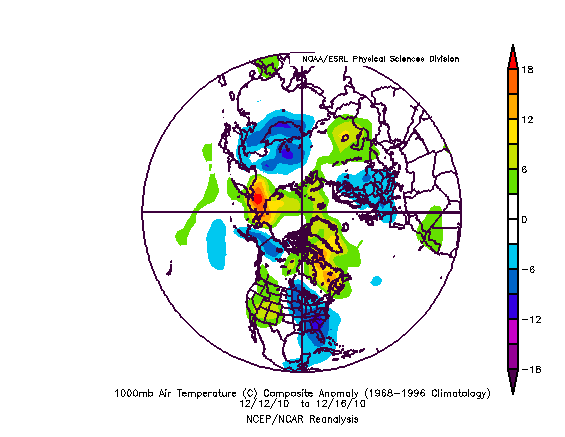Reply to comment
Snow joke
Mon, 20/12/2010 - 18:53 — dan
I can't quite bring myself to seek out anyone claiming the cold proves climate change isn't happening - as if foreign weather doesn't count somehow. But I thought it worth ending the year with a quick note on two of 2010's most striking climatic occurances. The common theme emerging this year: if a complex system is changing, how do you measure when specific events mean anything? Ultimately, the answer is: for any one 'event', you can't, but you can say pretty definitively that climate change = climate disruption, and the definition of 'extreme' will shift as the variance changes.
First-off were two stories that were actually one, connected story from the summer: Russian drought and Pakistani floods. Initforthegold is as good a place as any to start with that, including a good discussion of the difference between loading the dice and changing them for ones with higher numbers. The weather underground has some good graphics showing the jetstream changes tying the two together. Russia lost a quarter of its grain crop. In Pakistan, two and a half million people were affected.
As far us freezing our asses off - it was just listening to the news, and the impact the cold is having all across Europe that prompted me to write. There's one perfect graphic for this, via Peter Sinclair's blog. The NOAA has a pretty nifty live output showing the temperature anomaly over the Northern hemisphere. Compare also to this at init: most of the total anomaly is away from the equators, towards the poles. The NOAA anomaly graph shows some spots far North that are 15 degrees celsius warmer than the 68-96 average. Spending a few moments contemplating the breadth of the difference in both directions, and having a little think about how low and high pressure work, should be enough to get across that climate change was never going to mean an even increase.
There's no real need to make any specific claims about this being 'caused by' co2-induced climate change. The important question is: can we expect this sort of disruption to increase in the future? It's not rocket science, of course: if you push a complex dynamic system with any kind of forcing, it will attempt to get back to an equilibrium. In the meantime, you get disruption - and in chaotic systems, they'll manifest themselves in all sorts of exciting ways. We already have plenty of relatively well-understand oscillations, even if their timings - like the NAO - are never predictable. It would be one thing if we could expect to get this sort of winter regularly - that's something you can prepare for. But we actually have to prepare, as much as possible, for any eventuality, since there's no exact way of knowing how the system will eventually settle.
And that's presuming, of course, we decide it might not be a good idea to carry on pushing it. The more we do, the more the regional uncertainties increase (as well as uncertainties relating to feedbacks). That's an irony that MT over at initforthegold often points out: anyone claiming that uncertainty should mean inaction hasn't understood what's happening. Or they have, and they know that doubt, however slight, is a massively appealling get-out clause that many of us would dearly love to grab with both hands.

Recent comments
21 weeks 6 days ago
2 years 12 weeks ago
2 years 12 weeks ago
2 years 14 weeks ago
2 years 15 weeks ago
2 years 15 weeks ago
3 years 12 weeks ago
3 years 36 weeks ago
3 years 36 weeks ago
3 years 38 weeks ago